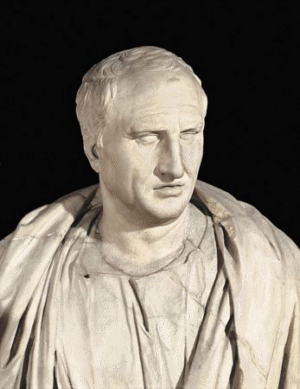 SKC Films Library SKC Films Library |
|
|
| SKC Films Library >> General and Old World History >> Italy >> Kings and Republic, 753-27 B.C. |
 Cicero Cicerostatesman, orator, and essayist Marcus Tullius Cicero was born in Arpinium on January 3, 106 B.C., into a well-to-do, but not wealthy, family. He studied law, oratory, Greek literature, and philosophy in Rome and Greece, and gained his first fame as a defense lawyer. As a prosecutor, he represented the people of Sicily against Gaius Verres, the "robber-governor" of the island. His presentation was so effective that Verres went into exile without awaiting a verdict. His fame and reputation now well established, he moved to Rome with intentions of furthering his political career. Cicero's skill as a lawyer and orator got him elected Praetor in 66 B.C., and as Consul in 63 B.C. In the latter position he was responsible for crushing the conspiracy of Catiline against the Republic. His first great speech, "First Oration Against Catiline," was made during this time. Cicero's political career came to a temporary end in 60 B.C., when he refused to join Julius Caesar, Pompey, and Crassus in the First Triumvirate, and was banned from Rome. All of his property was confiscated and, from 58 B.C. to 57 B.C., he was forbidden to live within 500 miles of Italy. Although he was finally allowed to return to Rome and had his property restored, he would not be allowed to engage in politics for over a decade. During his forced hiatus from politics Cicero kept himself busy by writing essays on philosophy, oratory, political theory, and theology. Over 1,000 of these essays still survive, and they give an excellent picture of the times. Cicero was finally reconciled with Julius Caesar after Pompey's defeat at Pharsalus in 48 B.C., but was still prohibited from engaging in politics. He was a witness to, and supporter of, Caesar's murder in 44 B.C., and briefly became the unofficial head of the Senate. During this period, Cicero was a supporter of putting Octavian (still a teenager at the time) on the throne instead of Marc Antony (leader of the conspiracy that murdered Caesar), since he believed the Senate could exert greater control over Octavian than it could Antony. During the debates, Cicero delivered a series of 14 speeches known as the Philippics, which ultimately helped drive Antony out of Rome. Unfortunately for Cicero, Octavian (by now Emperor Augustus) reconciled with Antony. In 43 B.C., Augustus, Antony, and Marcus Aemilius Lepidus formed the Second Triumvirate, and immediately set about ridding Rome of all their enemies. Cicero was one of many condemned to death, and was slain while trying to escape, on December 7, 43 B.C. PRINT SOURCE INTERNET SOURCE |
| SKC Films Library >> General and Old
World History >> Italy >> Kings and Republic, 753-27 B.C. This page was last updated on April 19, 2017. |